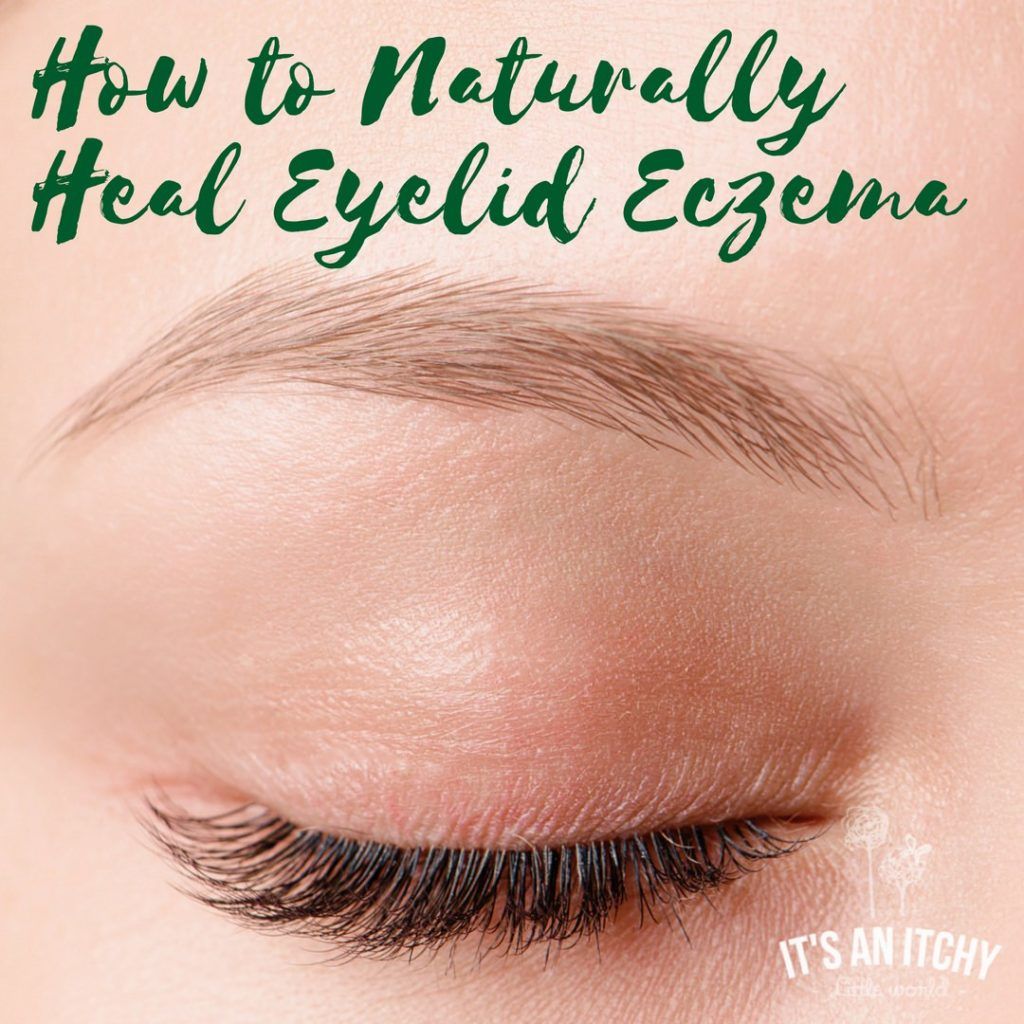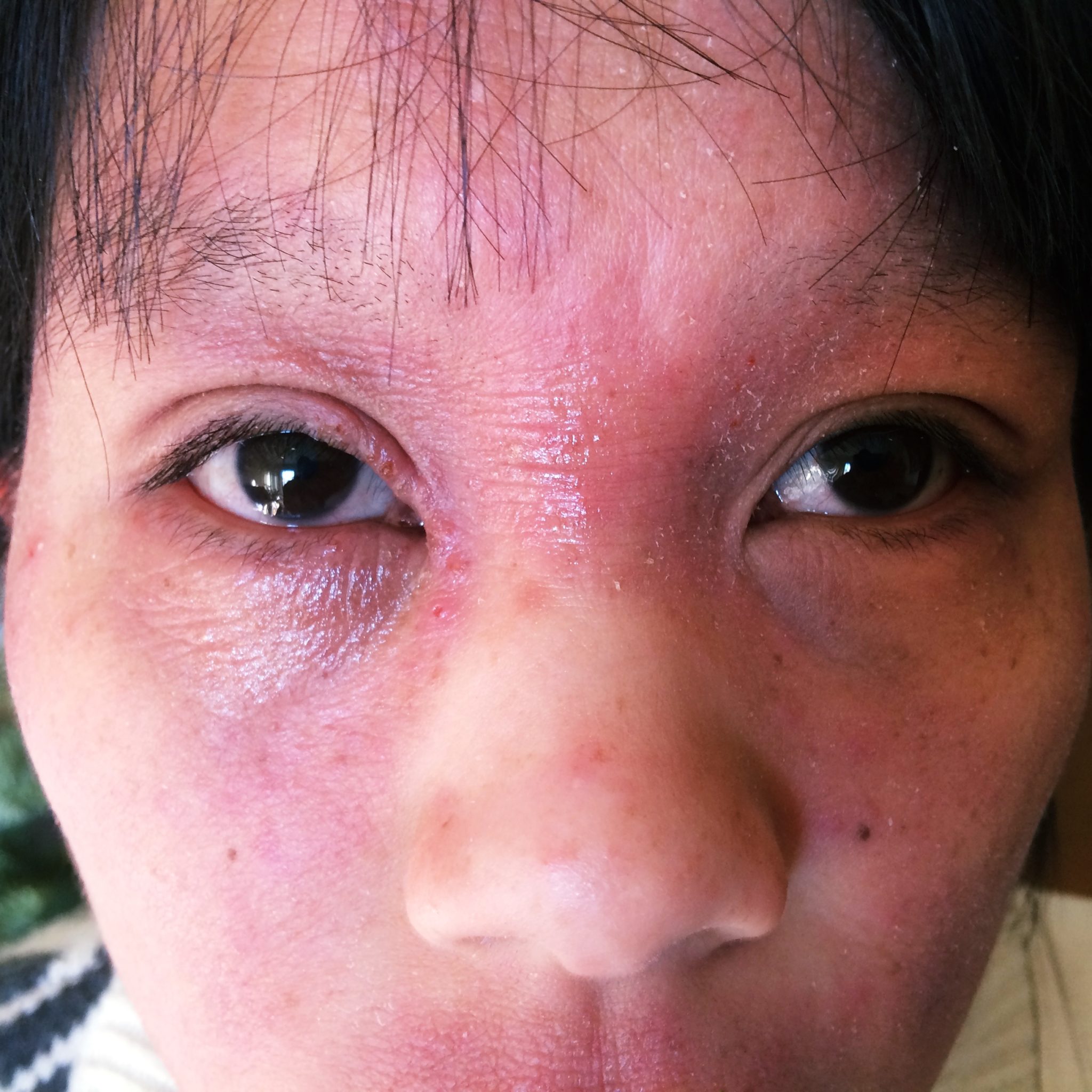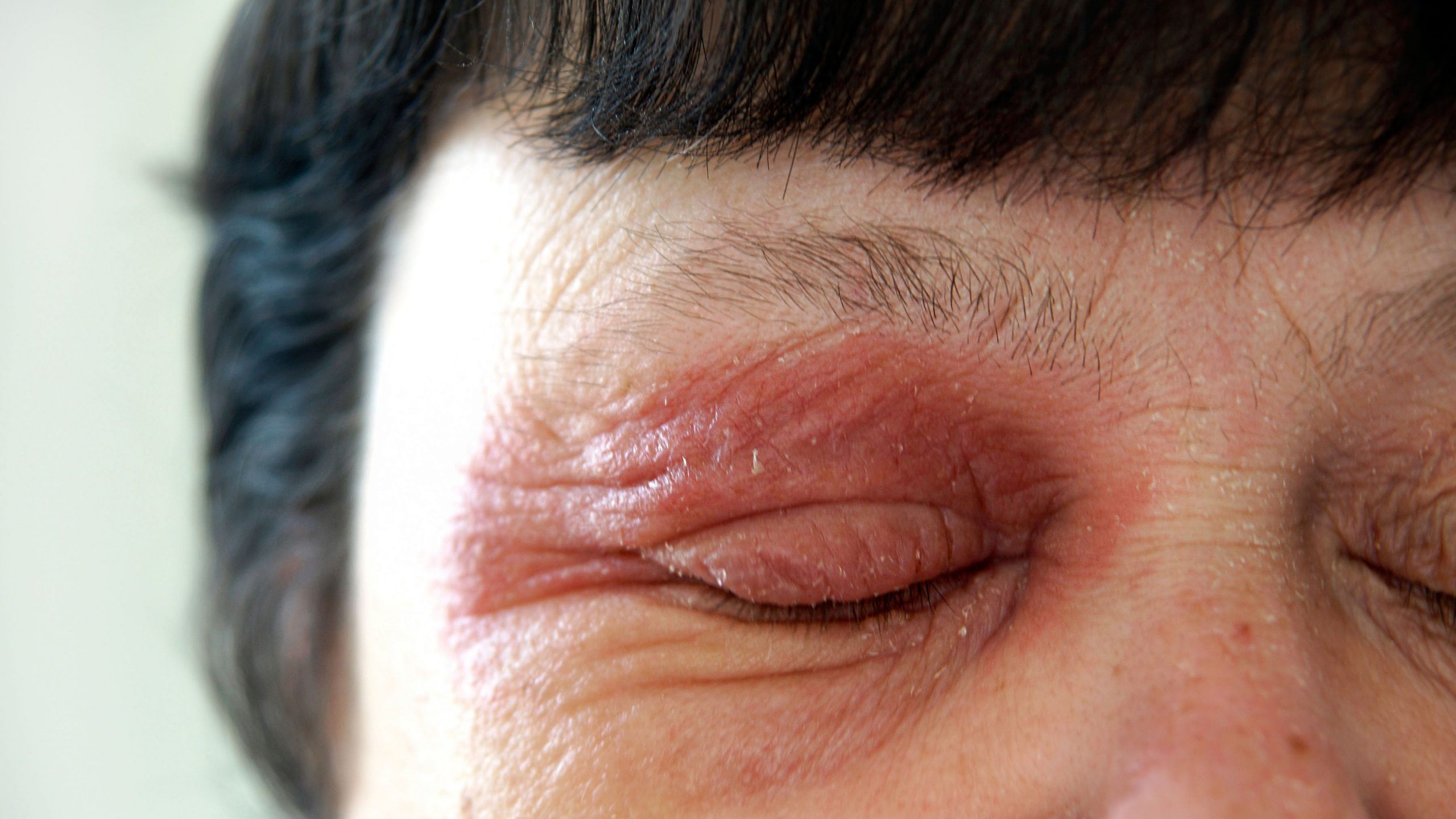What Does Eczema On Eyelids Look Like
Eczema on eyelids has some clear and obvious symptoms you can look for. This is what eyelid eczema can look like for you:
- Small bumps that ooze liquid if you scratch or irritate them
- Sensitive, raw and swollen regions of skin
- Red, brown or grey patches on your skin
- Thick, scaly and scabby areas of skin
- Itchy skin
- Dry and flaky skin
Outbreaks of eczema on your eyes can become infected. This is what infected eyelid eczema could look like for you:
- Your skin is so painful that you cant function during the day or sleep at night
- Your skin becomes covered with scabs, open sores and/or seeping yellow puss
- Your eyelid eczema wont go away despite you using treatment to tackle it
If youre seeing or experiencing any of the above, you should consult with your doctor or a registered pharmacist. Untreated eczema infections can lead you to experience other health issues.
How To Treat Eyelid Dermatitis
The best treatment for eyelid dermatitis is to avoid the trigger for your symptoms. Unfortunately, that isnt always possible.
Eyelid dermatitis flare-ups are often treated with topical medications . Your healthcare provider might prescribe a steroid cream to decrease inflammation. The potency of the cream will be low because the skin around your eyes is fragile compared to other parts of your body. In severe cases, your doctor might also prescribe oral steroid medication.
Topical calcineurin inhibitors are another type of ointment or cream used to treat eyelid dermatitis. These medications block the action of chemicals in your immune system. They are safer for your eyelid skin than steroid creams. But they can make your eyes sensitive to light.
Diagnosis & Treatment Options
Eczema is not a contagious condition. There is also no cure for it.
There are many treatment options that can help to manage eczema breakouts, reducing their severity and frequency. Eczema treatment is focused on repairing damaged skin and alleviating uncomfortable symptoms.
Current treatment options include:
- Topical corticosteroid creams and ointments. Anti-inflammatory creams target skin itchiness and inflammation.
- Systemic corticosteroids. Prescription corticosteroids can be swallowed or injected when topical creams are not effective enough.
- Antibiotics. These are prescribed when a bacterial skin infection is also present.
- Antifungal/antiviral medications. These are used to treat fungal or viral infections related to eczema.
- Antihistamines. These reduce itchiness and improve sleep.
- Topical calcineurin inhibitors. These are used to decrease inflammation of the immune system that is causing flareups.
- Skin barrier-repairing moisturizers. These help to keep moisture in and repair the skin.
- . Ultraviolet A or B light waves can be used to treat moderate eczema.
- Wet wrap therapy. This treatment is used for severe eczema. Three lukewarm baths per day are given, followed by the application of topical medications and moisturizers. The skin is then wrapped in wet gauze.
Read Also: How To Stop Eczema On Scalp
How To Get Hailey Bieber’s Viral Glazed Donut Manicure
When it comes to over-the-counter topical steroids like hydrocortisone, which help reduce inflammation and stop itching in other areas of the body affected by eczema, talk to your dermatologist beforehand and proceed with caution. Overuse of any steroid can lead to thinning out the skin, especially around the eyes where it can also change your eye pressure over time, Idriss warns.
Once your skin has returned to normal, restart using your typical routine one product at a time, buffering one-to-two weeks between each additional product. If the rash returns, Finney recommends patch-testing with your dermatologist or DIYing a test by applying products to your forearm a few times a day for a week. Check for any allergic reactions.
What should I do if over-the-counter products aren’t cutting it?
Along with a gentler and simpler skin-care routine, your dermatologist can prescribe anti-inflammatory non-steroidal topical medicines, since steroids can make your delicate eyelid skin even thinner. We often transition to non-steroids because they dont have the side effects , Gohara explains. Topical calcineurin inhibitors can, luckily, be safely used on eyelids, especially in cases that require treatment longer than four weeks.
Is Eczema Around Your Eyes Serious

Eczema around your eyes isnt always serious, but it can become serious without treatment. It can also lead to serious conditions, some of which can make you experience blindness.
Eye-based eczema also presents more of a risk than some other eczemas simply because of how sensitive your eyes are.
As eyes are prone to infections and protected only by a thin membrane, eczema near your eyes is more likely to cause complications than an eczema patch on your belly or butt cheek.
Recommended Reading: Causes Of Eczema On Feet
Can Eczema Cause Blindness
Eczema cant directly cause blindness. However, having eczema around your eyes increases your risk of eye conditions which can lead to blindness.
This risk increases the longer your eye eczema is left untreated. If youre experiencing an eczema flare-up around your eyes and start having vision problems you should consult your doctor ASAP.
Natural Treatment For Eczema Around Eyes
1. Vitamins
The anti-oxidant and immune-boosting buildings of some vitamins seem to restrict the intensity of eczema break outs. Vitamin E fights complimentary radicals and moisturizes the skin. Vitamins A and C are useful in increasing immune functions. The B vitamins help to repair and preserve healthy skin. Aim to get these vitamins in your diet rather than in a supplement.
2. Probiotics
If your eczema around eye is caused or gotten worse by allergies, try using probiotics. These useful germs that you take in a tablet kind work to stop the growth of damaging germs. This treatment may be most useful for children with eczema.
3. Tropical creams and gels
What to put on eczema around eyes? Licorice, witch hazel and chamomile extracts through a topical gel can help stop the spread of eczema. Because some of these herbs may cause allergies, it is essential to watch for intensifying of symptoms if you utilize any of these choices.
4. Gamma linolenic acid
Gamma linolenic acid is an important fat discovered in evening primrose and borage oils. Use these oils directly to the rash to decrease inflammation and provide nutrition to the skin.
5. Humidifier
Dry, hot air can enhance the intensity of eczema around your eyes. Including humidity to the air in your house may help the symptoms. A humidifier is a terrific way to add humidity however be sure to clean it frequently to prevent development of mold in the unit.
6. Witch hazel
8. More omega-3, less omega-6
Recommended Reading: Hand Foot And Mouth Or Eczema
An Eye For Warning Signs Can Save Your Eyesight
If you have AD, its important to play close attention to your eyes. When an eye problem lasts more than a few days, make an appointment to see your dermatologist or eye doctor.
You should also have eye exams as often as your eye doctor recommends. Ophthalmologists are the experts at diagnosing eye disease. Caught early, the eye diseases linked to AD are highly treatable.
Image
ReferencesHeiting G. Eye problems and diseases. AllAboutVision.com. Website last accessed January 31, 2018.
Leung DYM, Eichenfield LF, et al. Atopic dermatitis. In: Wolff K, et al. Fitzpatricks dermatology in general medicine. McGraw Hill Medical, USA, 2008:152.
Thyssen JP, Toft PB, et al. Incidence, prevalence, and risk of selected ocular disease in adults with atopic dermatitis. J Am Acad Dermatol. 2017 77:280-6.
All content solely developed by the American Academy of Dermatology
The American Academy of Dermatology gratefully acknowledges the support from Leo Pharma, Inc., and Sanofi and Regeneron.
The Cause Of An Itchy Eyelid Can Be A Diagnostic Puzzle But Persistence Often Uncovers Some Common Culprits
The Lids: A Special Challenge
| Figure 1. A patient with itchy, swollen, erythematous eyelids after using topical antibiotic solution post-cataract extraction. |
Common Culprits Ophthalmic solutions. Cosmetics.
| Figure 2. A patient with a history of chronic erythema, itching and puffiness of the eyelids. On patch testing, the patient was found to be allergic to fingernail polish. |
Nails. Metals. Hair dye.Approaching the Patient Patch testing.
| Figure 3. Patch testing performed on a patient’s back. Allergens are applied to the back and remain there for 48 to 96 hours. Ophthalmic preparations may not penetrate the back skin readily and may require high concentrations or erosions on the skin for increased penetration so that patch testing can be performed accurately. |
Treating the patient.Drs. Koo and Chang are in the Department of Ophthalmic Plastic, Orbital & Reconstructive Surgery at the Doheny Eye Institute, and Dr. Peng is in the Department of Dermatology at the University of Southern California, Keck School of Medicine. Contact them at 1450 San Pablo St. Los Angeles, Calif. 90033.1. Valsecchi R, Imberti G, Martino D, Cainelli T. Eyelid dermatitis: An evaluation of 150 patients. Contact Dermatitis 1992 27:143-7.2. Shah M, Lewis FM, Gawkrodger DJ. Facial dermatitis and eyelid dermatitis: A comparison of patch test results and final diagnoses. Contact Dermatitis 1996 34:140-1.
Also Check: Does Cortisone Help With Eczema
Natural Treatments For Eczema Around The Eyes
As well as soothing the skin, there are also plenty of natural treatments that you can try to see which one helps your symptoms the most. Because the skin around your eyes is particularly thin and sensitive, we would always recommend avoiding harsh chemicals. Weve put together some natural treatments that you might like to try.
What Is Eyelid Dermatitis
Eyelid dermatitis is a type of contact dermatitis. As that name implies, its a skin condition caused by your eyelids coming into contact with something a substance or physical trigger that youre allergic to or irritated by. Your eyelids react by turning red and scaly, and they may swell and thicken. Stinging, burning and itching are common symptoms of eyelid contact dermatitis.
Recommended Reading: Tea Tree Oil For Eczema For Babies
Can Eyelid Dermatitis Be Prevented
You can prevent eyelid dermatitis if you know what caused it and avoid that trigger. Additionally, try the following:
- Use products made for sensitive skin.
- Protect your eyelids by wearing protective glasses if youre going to be around extreme cold, high wind and/or a lot of dust.
- Avoid scratching or rubbing your eyelids.
- Touch your eyelids with clean hands only.
Can my diet help prevent eyelid dermatitis?
No, there are no foods or drinks you can ingest that can prevent eyelid dermatitis.
Eczema Around Your Eyes: What To Know And How To Treat It

07/05/20228 min read
No one wants to experience eczema around their eyes. It can be dry, itchy, red, scaly, and irritating. But just because you dont want to deal with something doesnt mean you wont. Unfortunately, eczema around the eye area is very common.
At Bodewell, we know what its like to suffer from less-than-ideal skin. Below, youll discover what causes this irritation and, most importantly, steps that you can take today to treat it at home.
You May Like: Lotion For Dry Skin And Eczema
When To Contact The Doctor
Eczema can increase your chances of developing other conditions because your skin can become raw, making you more susceptible to bacteria entering your bloodstream.
Skin conditions that commonly affect those with eczema on their eyelids include:
If you experience any of the conditions above, contact your medical professional immediately.
Eczema Around The Eye
When eczema occurs on the face, it often affects the skin around the eyes or eyelids . Eczema that develops near the eyes needs special attention because the eyes themselves can be affected.
Those with eczema around the eyes are more susceptible to certain eye problems such as conjunctivitis , inflamed cornea, and changes in the shape of the cornea .
Recommended Reading: Eczema Cream For 2 Year Old
Causes Of Eczema Around The Eye
To determine what might be causing the eczema around your eye, you should ask yourself the following:
- Do my eyes itch, swell, leak or become red after petting dogs, cats, other animals?
- Are certain beauty products like soap, makeup, facial cleanser or even shampoo affecting my eyes?
- Do I have swollen, itchy or dry eyes when the temperature changes?
What Do Eyelid Eczema Symptoms Look And Feel Like
People with eczema generally experience symptoms like very dry and itchy skin red, brown, or gray skin patches raised, weeping bumps and thick, cracked, or scaly skin. They may also have raw, sensitive, swollen skin due to scratching-induced irritation.
For eyelid eczema specifically, you may experience inflamed or reddened skin on and around your eyelid, or cracked, discolored skin in the general area, board-certified dermatologist Ife J. Rodney, M.D., founding director of Eternal Dermatology + Aesthetics and professor of dermatology at Howard University and George Washington University, tells SELF. The affected area can also sting and burn.
Recommended Reading: Can Stress Cause Eczema Outbreaks
Rash Around Mouth Child
Rash around mouth for children can be caused by one or the combination of the following
- Messy eating, after feeding your child you should wipe his/her mouth clean to prevent rash from developing around mouth
- Impetigo, this is a contagious skin infection that can be transmitted to your child through closer physical contact with infected objects or people
- Bacterial infection from playing and eating dirty objects can also be the cause for this rash to develop around mouth.
- Drooling, leaving saliva on lips of your kid for long can cause rash to develop around them.
- Hand-mouth disease, coxsackie are common virus that can cause rash to develop on children mouth, the virus can be contacted form playing with infected or dirty objects.
As a parent you need to be very cautious of what objects your child plays with. Make sure the child is cleaned after meals and the objects your child plays with are clear, dry and sterilized.
Atopic Eczema Around The Eyes
The primary difference separating atopic eczema from contact eczema is the cause. Atopic eczema is not due to an allergy but rather to atopy, a genetic hypersensitivity to the environment. The eyelids are a common area for atopic dermatitis to appear. It can sometimes be tough to distinguish between all these conditions, from allergic conjunctivitis caused by airborne allergens to allergic contact eczema.
Atopy can manifest as eczema as well as asthma, rhinitis, conjunctivitis, and more.
Recommended Reading: Does Cortisone Help With Eczema
Also Check: Foods That Cause Eczema On Face
How Is The Diagnosis Of Allergic Eyelid Contact Dermatitis Made
Diagnosis of eyelid allergic contact dermatitis is made by identifying its characteristic features.
- An itchy rash that affects one or both eyelids
- This is most likely to occur intermittently at intervals of days to years
- Suspicion that it has been caused or aggravated by contact with an allergen .
- Patch tests to one or more suspected contact allergens are positive
Knowing the details of all substances that the skin may have been exposed to in skin care, hobbies and work are an important part of the detective work required to find the cause of a eyelid dermatitis. Patch tests should be arranged to establish or confirm the triggering allergen.
Treatment For Eczema Around The Eyes

The best remedies for eye eczema will depend on the cause of your symptoms – but we know identifying the cause of your symptoms isn’t always easy! If your symptoms are new, and youve recently started using something new around your eyes, such as an eye cream or mascara, then it could simply be a case of stopping using it.
Read Also: Why Is My Eczema Burning
What Can Cause Eczema Around The Eyes
There are three main types of eyelid eczema – atopic contact dermatitis, atopic dermatitis and irritant contact dermatitis. We go into more detail on each in the section below.
Unfortunately, it can be tricky working out the cause of our symptoms. The eyes are prone to developing eczema because the skin around the eyes is very thin, with a rich blood flow and very little fat.
Atopic contact dermatitis is caused by an immune reaction to something that youre allergic to that youve used around your eyes. The immune system creates antibodies called immunoglobulin E which then causes the itching and irritation of eczema around the eyes.
Atopic dermatitis is usually caused by something internal, such as something youve eaten that youre allergic to, that causes the same symptoms as atopic contact dermatitis.
Irritant contact dermatitis also causes the same symptoms due to something youve used around the eyes, but instead of it being an allergen that youre allergic to, its an irritant.
Diagnosing Eczema Near Your Eyes
Diagnosing eczema anywhere is actually super easy. They dont need to do lab tests or anything.
Your doctor will ask you a bunch of questions if youve had eczema in other places or have had any irritants near your eyes.
Once they ask some questions, theyll tell you if its eczema or not. The only extra step is that your doctor may want to do a patch test, which exposes an area of skin to allergens, to check for a reaction.
Read Also: Best Laundry Detergent For Eczema